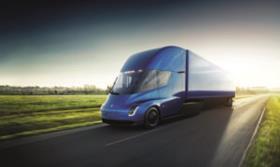If Elon Musk can send a car into space on reusable rocket boosters, then surely a down-to-earth electric truck travelling 500 miles on a single charge isn’t beyond the capabilities of today’s engineers?
Some industry sceptics have questioned the Tesla Semi’s commercial viability in becoming a mainstream contender in the heavy truck sector.
However, it appears that increasing numbers of well-known retailers and logistics firms are willing to give the new technology a whirl on their fleets.
MT’s online tally of social media news from the likes of Walmart, Pepsico, UPS and DHL shows an easy 450-plus units already on pre-order from Tesla, while some online sources believe this figure could even top the 1,200 mark.
Founders Series
The truck can be reserved for £15,000, with final costs expected to be £110,000 for a 300-mile-range truck, £140,000 for a 500-mile-range semi, and £150,000 for the top-spec Founders Series range.
While the US version has been given a 2019 production date, Tesla told MT it was not able to confirm a European launch date at this stage.
However, it has opened up its order book to three European countries – Norway, the Netherlands and the UK – although Tesla would not disclose to MT how many pre-orders had been taken from across Europe.
One of the first companies in Europe to reveal its interest in the Tesla Semi was Dutch zero-emission operator Breytner, which announced its intention to order one unit in November.
The logistics firm already runs a fleet of all-electric trucks in major Netherlands cities and is testing a 27-tonne rigid hydrogen-fuelled lorry as part of a European trial.
“We want to be a frontrunner in zero-emission transport,” said MD Marie-José Baartmans on the company’s website, “and Tesla has the same ambition.”

He added that the Tesla Semi would be a disruptive influence in the European market, due to its “progressive technology” and pricing: “With the current price level, Tesla sets the benchmark for other OEMs. This makes a competitive total cost of ownership much more realistic,” he said.
Lithuanian firm Girteka Logistics has also publicly announced an order for its pan-European logistics operation.
“Girteka Logistics wants to be the greenest transportation company available, and electric trucks are the future,” said CEO Edvardas Liachovicius.
Meanwhile, in Norway postal firm Posten Norge is looking to trial a unit, while wholesaler Asko is reported to have ordered a batch of 10.
Battery technology
While MT is yet to hear of a confirmed order from a UK operator, the Tesla Semi is most certainly on the radar of many.
Bibby Distribution said it is “absolutely watching” the progression of Musk’s creation. “It’s the way technology is heading,” said head of fleet and procurement Adam Purshall (pictured).

“We’re seeing it in the car market, in terms of the rise in hybrids and fully electric cars. As the battery technology improves, it will follow in the commercial world as well.
“The battery technology and the ranges that will be required are probably five to 10 years away. But what’s good about the Tesla is that it’s the start of electric trucks becoming commercially viable and signals a big change in the industry.”
He added that Bibby Distribution is keen to be at the forefront of trialling new technology, acknowledging the fact that early adopters will have to cope with operational teething issues.
“It’s about understanding costs and knowing when electric trucks are going to become commercially available and in what quantities. That’s a bit of an unknown at the moment,” said Purshall. “It has launched the Tesla with lots of fanfare but there are no details behind it in terms of operating costs. It’s a wait-and-see.”
Watching closely
Rental firm Fraikin UK told MT the company is positioning itself as a key player in the alternative fuels market and is monitoring closely the development of fully electric heavy trucks.
Head of procurement Ben Jones said: “In terms of Tesla, it’s interesting to see how it perceives the industry and the direction in which it thinks it will move.

"Despite the scepticism within the industry as to whether it will achieve successful mass production of its prototype within the promised timescales, Tesla has to be recognised and respected for how it is accelerating change in the sector and making the other OEMs take notice and consider their approach. This can only be a good thing for customers in the long run.”
Fraikin believes that if the signs are positive and Tesla goes into mass production, the electric truck could be a serious consideration.
However, in the short term, the focus is more likely to be centred around natural gas or hybrid solutions, with all-electric lighter trucks used for urban operations.
Order books
DHL meanwhile, having already announced an order of 10 Tesla Semis for its US same-day operation, is keen to watch how the technology develops for the UK market.
A spokesman told MT: “In March 2017, Deutsche Post DHL Group announced its commitment to reduce all logistics-related emissions to net zero by 2050. Zero-emission technologies represent an important pillar for our future fleet development and we welcome innovations such as the Tesla Semi.
“As with any new technology, we will undertake trials in real-life applications and, based on the results, will then consider wider roll-out.”
Regarding the wider adoption of electric trucks for its UK fleet, DHL said it first used these more than a decade ago in 2007, and has since gained “a great deal of experience”.
The spokesman added: “Until now, limited battery range has prevented their use on a wider scale, but recent advances mean these barriers may soon be overcome and we look forward to the results of the [Tesla] trial.”













